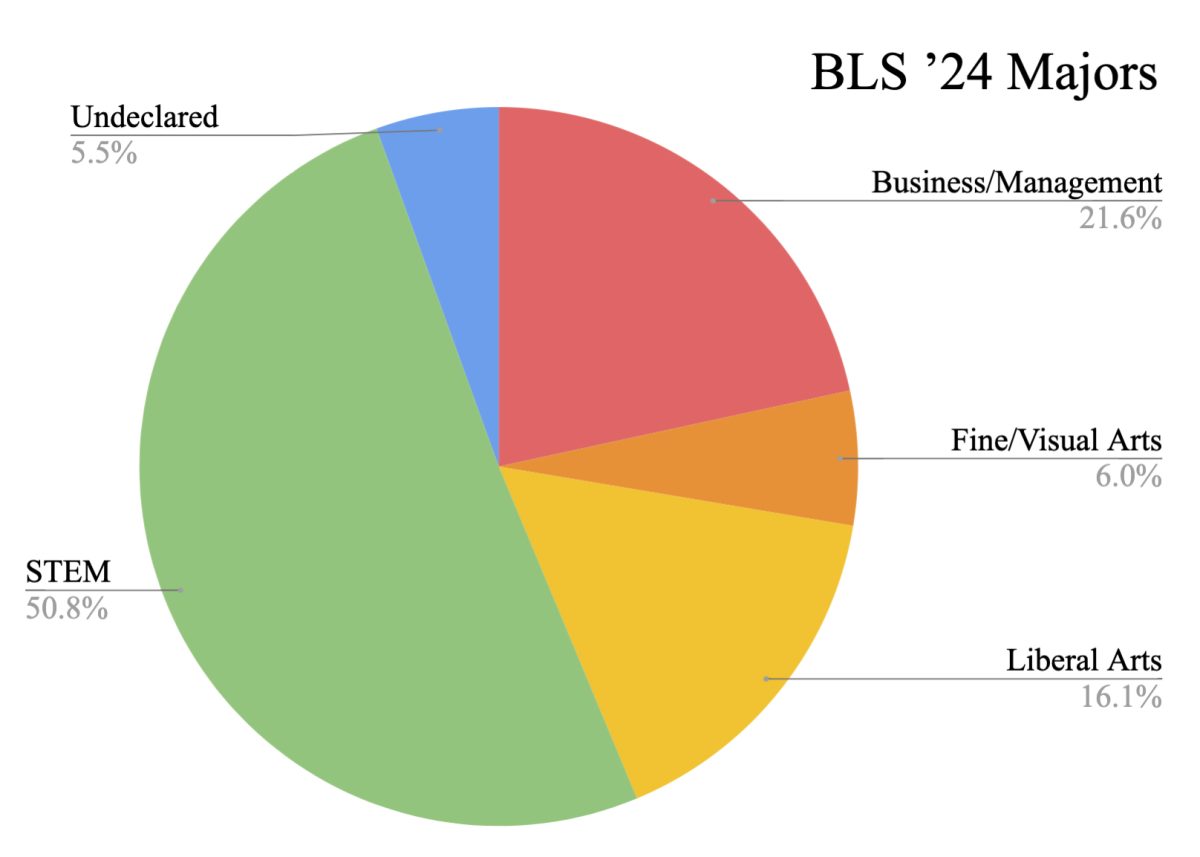Everyone at Boston Latin School has undoubtedly heard the question: what do you want to study in college? In the past, most students at BLS would have answered law, politics or government, as the curriculum was focused on humanities. Now, however, responses nationwide have shifted toward computer science, engineering or chemistry. This trend has spread to BLS. It is not surprising that a majority of BLS seniors have declared a STEM major: according to the data collected by the BLS 2024 Commits Instagram page, 50.8 percent of the Class of 2024 have chosen to go into STEM. With the spike of interest in STEM comes the crash of a different major: humanities, the umbrella covering all of human society and culture from art to history. This trend is reflected in the BLS Class of 2024: only 16.1 percent of them plan to major in liberal arts.
Although mourned by enthusiasts of the humanities, in a time of constant innovation, the spotlight on majors in STEM is valid, as they yield long-term security and practicality.
BLS math teacher Ms. Alyssa Sarkis comments, “If we’re thinking about [STEM] and how fast [it is] progressing, there’s clearly a market for that, and people see that as jobs or as a vital part of their life, and they want to be involved in that development.”
STEM majors, moreover, earn 17,000 to 24,000 more dollars, on average, than non-STEM majors, which highlights the appeal for occupations in the field. STEM workers generally provide more tangible services — everyone can see how doctors are helpful — and their qualifications are concrete. The value of humanities, conversely, is not only harder to quantify but also subjective; its value depends on the consumer, and the careers humanities majors could pursue are vague.
BLS science teacher Ms. Gina Castellanos Ellsworth explains, “The bottom line is that a company that generates billions of dollars has more money to pay for top talent.”
These more clearly defined job requirements assure a clearer career path — a welcome prospect for the newly graduated. A pre-medical student, for example, knows that medical school will always be an option for them; a computer science major knows they can find a job at a tech company. In short, a STEM major gives students the “safer” option: guaranteed work that pays well.
That is not to say that the humanities do not have value, as the interpersonal skills provided in the field are necessary in all lines of work.
BLS history teacher Ms. Clara Webb asserts, “There’s so much that goes into making something successful, and [companies] need all kinds of skills.”
This applies to STEM as well, as even the most brilliant minds still need leaders who can sell their vision to others. Even outside of a STEM lens, humanities has its importance. Ms. Webb contends, “Pure humanities careers do exist, and they do have a value,” She continues, “[They are] about understanding ‘How did we get here?’ and ‘Who are we?’ […] I don’t think that’s ever going to go away.” Humanities are what make us inherently human — the love that goes into art can’t be replicated in a lab.
There is a hard line, however, between passion and practicality. Higher education is expensive, and even with scholarships, it is important that the selected major is worth the investment. Humanities can be found everywhere, not just in a classroom. One does not need a humanities degree to learn empathy or teamwork. The major someone chooses does not define their entire identity, either.
“[Majors] are not the only dimension,” Ms. Webb clarifies. “You can certainly pursue [humanities] even if it isn’t your major in college.” If someone can major in something while balancing additional interests, it is objectively better to pursue a higher-paying field. After all, financial stability provides the luxury of maintaining hobbies out of pure interest and not necessity. STEM majors offer more crucial financial and occupational security for a person’s livelihood than what humanities could ever provide.
By majoring in STEM, students can have it all — endless work opportunities, a good wage, a solid career path — while still being able to casually pursue their other interests. There is no guaranteed income in subjective fields like the humanities, and people cannot feed themselves with passion alone. Although it may sound shallow, it is better to pursue profitability because money is essential for survival in modern-day society. The dominance that STEM has over the humanities is for the better; the trend will hopefully continue.








